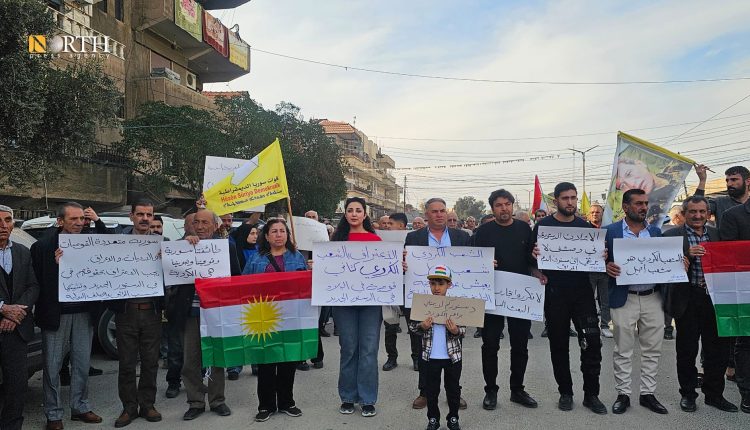Protests in Kurdish Cities of Northeast Syria Against Constitutional Declaration
By Kardo Roj
QAMISHLI, Syria (North Press) – Hundreds of residents and activists took to the streets in several cities of northeast Syria on Friday, protesting the recently announced constitutional declaration for the country’s transitional phase.
The demonstrations, held in Qamishli and Amuda, were organized by local activists opposing the document signed by transitional President Ahmad al-Shara on Thursday. Protesters carried banners calling for a decentralized Syria, rejecting the retention of the state’s official name, the Syrian Arab Republic, and demanding inclusivity in governance.
Similar protests were reported in other towns across northeastern Syria, following calls by civil society groups and political activists to reject the constitutional framework.
The controversial constitutional declaration, which sets a five-year transitional period, retains the country’s official name and designates Islam as the religion of the president. Critics argue that these provisions fail to reflect Syria’s ethnic and religious diversity, disregarding the aspirations of Kurdish, Assyrian, and other minority communities.
The Syrian Democratic Council (SDC), the political wing of the Kurdish-led Autonomous Administration of North and East Syria (AANES), issued a statement on Friday rejecting the declaration, stating that it “reproduces authoritarian rule in a new form.”
Similarly, the Kurdish National Council (KNC), a key opposition group, expressed concerns that the framework does not adequately address minority rights or ensure political inclusivity.
Protesters in Amuda and Qamishli emphasized the need for a decentralized governance system that guarantees equal representation for all ethnic and religious communities. “This declaration ignores the reality of Syria’s diversity,” said one demonstrator in Qamishli. “We need a constitution that represents all Syrians, not just a continuation of past policies.”
The Kurdish-led AANES, which governs large parts of northeast Syria, has long advocated for a decentralized federal system, arguing that centralized rule has historically marginalized ethnic and religious minorities.
The widespread rejection of the constitutional declaration in northeastern Syria poses a challenge for the transitional government, which seeks to unify the country following the fall of the previous regime. As protests grow, the response of the new authorities will determine whether meaningful political dialogue can take place or if tensions will escalate further.

